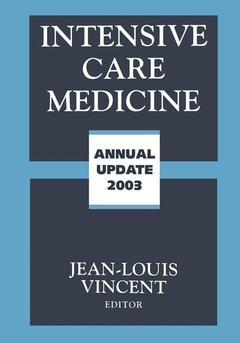Epithelial-Endothelial Alterations.- Role of Epithelial ICAM-1 in Endotoxin-Induced Lung Injury.- Pulmonary Endothelium-Bound Enzymes in the Normal and the Diseased Lung.- Endothelial Cell Replacement Therapy in the Critically Ill.- Sepsis: Mechanisms and Therapy.- Reconciling Clinical Criteria and the Use of Genetically Engineered Animals in Sepsis Research.- Human Genetics and Human Sepsis: Is the Tail Wagging the Dog?.- Microarray Technology in Sepsis: Tool or Toy.- Update on Anti-Endotoxin Therapies.- An Update of Childhood Meningococcal Sepsis.- The Effect of Alcohol Consumption on Risk of Sepsis and ARDS.- Supplementing Arginine during Sepsis: from Theory to Clinical Practice.- Coagulation Abnormalities.- Severe Thrombotic Microangiopathy in Critically Ill Patients.- Heparin in the Treatment of Critically Ill Patients on the ICU Patients.- Endogenous Anticoagulants and the Role of Heparin in the Treatment of Severe Sepsis.- Is Recombinant Activated Factor VII a Universal Hemostatic?.- Infectious Challenges.- Nasal Carriage of Staphylococcus aureus: Associated Risks and Preventive Measures.- Current Dilemmas in the Management of Adults with Severe Community-Acquired Pneumonia.- Evaluation of Non-Resolving and Progressive Pneumonia.- Candida in Lung Specimens from Non-Neutropenic ICU Patients: Infection or Colonization?.- A Reappraisal of Selective Decontamination of the Digestive Tract.- Management of Catheter-Related Sepsis in the ICU.- Empiric Antibiotics in Critical Illness: Do they Help or Harm?.- Acute Respiratory Failure.- Mortality Rates in Patients with ARDS: What Should be the Reference Standard?.- Sigh in Acute Respiratory Failure.- Ventilatory Support.- The Conditioning of Medical Gases during Spontaneous Breathing.- Recent Innovations in Mechanical Ventilatory Support.- Expiratory Flow Limitation in Mechanically Ventilated Patients.- Respiratory Muscle Unloading during Mechanical Ventilation.- High Frequency Oscillation (HFO): Physiological Basis for a Potentially ‘Optimal’ Protective Ventilatory Strategy.- Withdrawal from Mechanical Ventilation in Patients with COPD: The Issue of Congestive Heart Failure.- Inhalation Therapies.- Inhalation Therapy during Mechanical Ventilation.- Trials of Surfactant Replacement Therapy in Patients with ARDS.- Surfactant Therapy: Beyond a Rescue Therapy for ARDS.- Perioperative Complications.- High Risk Surgical Patients: Why We Should Pre-Optimize.- Pain Control in the Intensive Care Unit.- Respiratory Failure Post-Coronary Bypass Surgery.- Postoperative Respiratory Management.- Myocardial Ischemia or Cardiac Failure: Which Constitutes the Major Perioperative Risk?.- Cardiac Crises.- Acute Coronary Syndromes.- Pre-Hospital Reperfusion Strategies to Optimize Outcomes in Acute Myocardial Infarction.- Glucose, Free Fatty Acids, and Insulin Following Acute Myocardial Ischemia.- Quantifying Left Ventricular Ejection Effectiveness.- Cardiogenic Shock.- Cardiopulmonary Resuscitation.- Inhibition of the Sarcolemmal Sodium-Hydrogen Exchanger: A Potential Treatment for Resuscitation from Cardiac Arrest.- Immediate Defibrillation for Out-of-hospital Ventricular Fibrillation.- Monitoring Systems.- Cardiac Output Monitoring: Will New Technologies Replace the Pulmonary Artery Catheter?.- Assessment of Cardiac Preload and Volume Responsiveness using Echocardiography.- Early Transesophageal Echo Doppler Approach in Trauma: Emergence of a New Tool.- Management of Circulatory and Respiratory Failure Using Less Invasive Hemodynamic Monitoring.- Minimally Invasive Hemodynamic Monitoring.- Oxygen Availability.- Microvascular Alterations in Patients with Circulatory Failure.- Critical Tissue Oxygen Thresholds for the Induction of Apoptosis in Critical Illness.- Reflectance Spectrophotometry and Tissue Oxygenation in Experimental and Clinical Practice.- The Case for Tissue Base Excess.- Clinical Use of Venoarterial PCO2 Difference in Septic Shock.- Fluid Therapy.- Hypovolemia: An Integration of Organ System Physiology.- New Light on Volume Therapy in the Critically Ill?.- Ethyl Pyruvate: A Novel Anti-inflammatory Agent.- Clinical Use of Artificial Oxygen Carriers.- Is There a Role for Red Blood Cell Transfusion in the Critically Ill Patient?.- Transfusion Triggers.- Renal Failure.- Use of Dopaminergic Agonists for Renal Protection in the ICU.- Interpreting the Mechanisms of CRRT in Sepsis: The Peak Concentration Hypothesis.- SLEDD and Hybrid Renal Replacement Therapies for Acute Renal Failure in the ICU.- Brain-lung Interactions.- Advanced Airway Management in the Neurologically Injured Patient.- Treatment Conflicts between the Injured Brain and the Lung.- Ventilatory Management in Head Injured Patients.- Neurological Crises.- Induction of Ischemic Tolerance in the Brain: A Novel Neuroprotective Strategy?.- Positron Emission Tomography: Anticipated Usefulness in Critical Care Settings.- Measurement of Regional Cerebral Blood Flow by Near Infrared Spectroscopy and Indocyanine Green Dye Dilution.- Invasive Multimodal Online Monitoring in Severe Stroke Patients.- Critical Care of Myasthenic Crisis.- Neuromuscular Abnormalities in Critical Illness.- Emergency Medicine.- Interhospital Pediatric Intensive Care Transport.- Carbon Monoxide Poisoning.- Club Drugs: A New Challenge in Clinical Toxicology.- GI Crises.- New Insights into the Pathophysiology and Severity Assessment of Acute Pancreatitis.- Necrosectomy for Severe Acute Pancreatitis.- Acute Liver Failure in the ICU.- Metabolic Support.- Critical Role of Hormones in Traumatic Injury and Outcome.- Hyperglycemia and the Lung.- Glycolysis in Sepsis and other Stress Conditions.- Dehydroepiandrosterone (DHEA) and its Sulfate (DHEAS) in Critical Illness.- Vasopressin and Hypothalamic-Pituitary-Adrenal Axis Relationships.- Clinical Applications of Indirect Calorimetry in the Intensive Care Setting.- Management, Education, and Ethics.- Can Nosocomial Infections and Iatrogenic Events Serve as Quality-of-Care Indicators in the ICU?.- Hospital and ICU Organizational Structure and Quality of Care for Surgical Patients.- Volume and Outcome in Pediatric Critical Care: How Much is Enough?.- Human Factors and ICU Outcomes.- The Risk of Nursing in an Error-Prone Environment.- Identifying the Patient-at-Risk: Technology and ICU Outreach Services.- Multimedia Medical Education and E-Learning.- End-of-Life Care in the ICU: Toward a Newer Concept of Futility.




